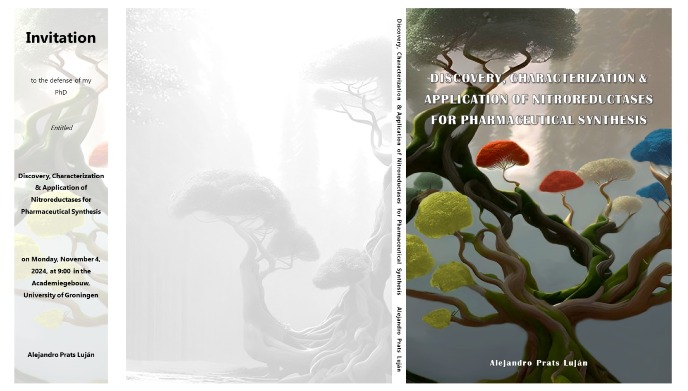PhD defence A. (Alex) Prats Luján
| When: | Mo 04-11-2024 09:00 - 10:00 |
| Where: | Academy Building |

Discovery, characterization and application of nitroreductases for pharmaceutical synthesis
This thesis explores the revolutionary potential of flavin-dependent nitroreductases in synthesizing pharmaceutically active compounds and their precursors. By investigating various nitroreductase-like flavoenzymes, the study uncovers their exceptional ability to reduce a wide range of nitro compounds and α,β-unsaturated carbonyl compounds. These enzymes exhibit remarkable catalytic versatility, performing both nitroreductase and ene-reductase activities with high chemo-, regio-, and enantioselectivity. Integrating these enzymes into photobiocatalysis further enhances their utility, achieving the promiscuous reduction of diverse ketones to optically pure alcohols without affecting C=C or C≡C bonds. The study also addresses the challenge of reducing nitroaliphatic and nitroaromatic compounds to amines, azoxybenzenes, and azobenzenes. By employing a chlorophyll-based photocatalytic system in synergy with nitroreductases, selective conversions of nitroarenes and nitroaliphatics were achieved with yields up to 97% and 90%, respectively, effectively bypassing the troublesome bio-Nef reaction. Moreover, the nitroreductase BaNTR1 excelled in the photoenzymatic synthesis of anthranils and quinolines from o-nitro-phenyl-substituted carbonyl substrates, achieving excellent conversions and product yields. This high chemoselectivity allows for targeted reduction of nitro groups, paving the way for the tailored synthesis of diverse N-heterocycles from simple nitro compounds. This thesis heralds a new era in photobiocatalysis, offering innovative solutions for the efficient and selective synthesis of complex carbonyl and nitrogen-based pharmaceutical compounds.
